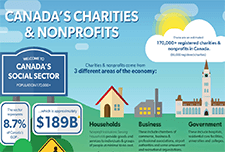Discover financial empowerment resources
Discover financial empowerment resources
This article shares stories from Amadeusz, an organization that works with people who are incarcerated to further their high school and post-secondary education. Learn about how experiences with the education system are deeply connected with basic needs for housing, income, and social...
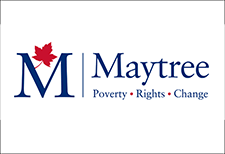
This policy brief argues that employment is not a viable path out of poverty unless policy interventions first address the barriers that prevent work and create a labour market that offers decent jobs. A successful poverty reduction strategy must also speak to the needs of those who will never work...

What do we know about the millions of people working in Canada’s nonprofit sector? This report by Imagine Canada provides a detailed profile of these workers, including demographic and salary information, and uncovers how the nonprofit workforce differs significantly from the broader Canadian...
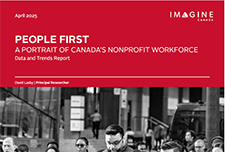
Canada’s Black population has grown significantly over the last two decades and now accounts for 4.3% of the Canadian population. This diverse community includes those with deep historical roots, particularly in Atlantic Canada, alongside recent migrants from the Caribbean, Africa and beyond....
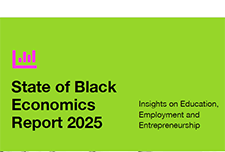
This article analyses results from the Canadian Housing Survey, 2022 , using new variables on homelessness and factors contributing to regaining and maintaining housing. The paper provides a descriptive overview of different types of homelessness experiences in Canada, highlighting select...

This infographic highlights key findings on accessibility barriers among employed persons aged 15 to 64 with disabilities or long-term conditions. The population covered by the Survey Series on Accessibility - Experiences with Accessibility and Employment (SSA-EAE) comprised those who participated...
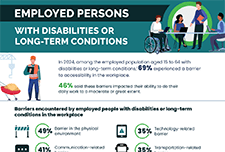
Individuals with lower incomes may face a range of economic challenges and barriers to upward mobility. Two types of services that may both contribute to the goal of improving individuals’ financial situations are employment and training (E&T) services, which have the goal of improving...

As life expectancy in the U.S. increases, older adults will comprise a larger share of the population than ever before. At the same time, older adults will play an increasingly important role in the U.S. economy. Their contributions through consumption, labor, and unpaid activities—such as...

When immigrants arrive in Canada, they face many financial challenges. From opening a bank account to using a credit card, from buying a house to paying for insurance, they may find it difficult to navigate the nuances of Canadian markets. Newcomers rely on industry professionals to assist them in...

The FCAC has updated their dashboard that present the result of two FCAC surveys: the COVID-19 Financial Well-being Survey and the Survey on Canadians' use of Bank Products and Services. The dashboard was updated in July 2023 with data collected between August 2020 and May 2023. Some indicators...

Employment and income experiences for persons with disabilities often differ from persons without disabilities. Barriers to accessibility within these areas often lead to lower employment rates and decreased income levels for persons with disabilities, in relation to persons without...

CPA Canada developed the Financial Wellness Guide to help you understand money basics. Complete the online questionnaire to get straightforward tools and information, based on your financial situation, that will help you with your financial...
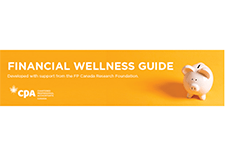
The Asset Funders Network engages philanthropy to advance equitable wealth building and economic mobility. For 18 years, AFN has provided a forum for grantmakers to connect, collaborate, and collectively invest in helping more people achieve economic security. This report reflects their work over...
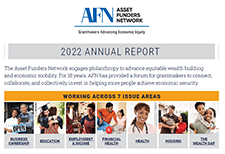
Canada’s Disability Inclusion Action Plan is a comprehensive, whole-of-government approach to disability inclusion. It embeds disability considerations across our programs while identifying targeted investments in key areas to drive change. It builds on existing programs and measures that have...
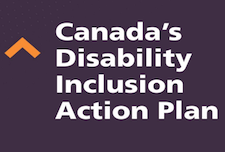
The Thriving or Surviving study uncovers the kitchen table issues that confront Canadians daily, revealing how the country is coping with concerns such as debt, savings, emergency funds and financial...
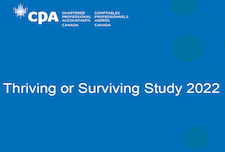
The following snapshot aims to highlight how Anti-Black racism and systemic discrimination are key drivers of health inequalities faced by diverse Black Canadian communities. Evidence of institutional discrimination in key determinants of health is also presented, including education, income, and...

Canada’s National Advisory Council on Poverty’s second Annual Report, Understanding Systems, is the first report to provide a glimpse into poverty since COVID-19. Based on community engagements with Canadians and provinces/territories over the last year, the Council has recommended five...
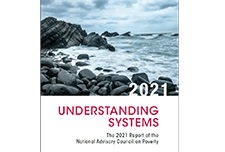
This report presents the findings of an ethnographic research project undertaken by researchers at the Accelerated Business Solutions Lab (ABSL) at the Canada Revenue Agency (CRA). It is the second of a series of ethnographic reports on the experiences of vulnerable populations. The objective of...
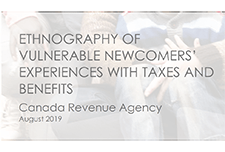
An important aspect of the impact of COVID-19 is its disproportional impact across gender. This Insights article proposes a year-over-year approach that compares employment from March 2020 to February 2021 to their March-2019-to-February-2020 counterparts. It uses the Labour Force Survey to...
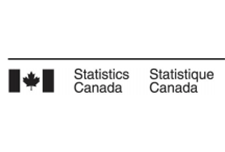
The COVID-19 pandemic has changed how production occurs in the economy in two ways. One is the full or partial closure of non-essential activities such as travel, hospitality, arts and entertainment, personal services, airlines, etc. The other is the widespread shift from in-office work to...

To mitigate the effects of the coronavirus disease 2019 (COVID-19) pandemic, the federal government has implemented several financial assistance programs, including unprecedented funding to food charities. Using the Canadian Perspectives Survey Series 2, the demographic, employment, and behavioural...
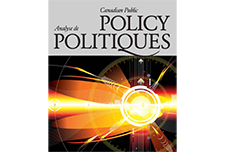
This article uses data from a recent crowdsourcing data initiative to report on the employment and financial impacts of the COVID-19 pandemic on Indigenous participants. It also examines the extent to which Indigenous participants applied for and received federal income support to alleviate these...

The COVID-19 pandemic has highlighted the varying labour market experiences and outcomes of diverse groups of Canadians. To mark Asian Heritage Month, Statistics Canada is providing a profile of the employment characteristics of the three largest Asian populations in Canada: South Asian, Chinese...

April Labour Force Survey (LFS) data reflect labour market conditions during the week of...

This infographic shows the size, scope, and economic contribution of charities and nonprofits across...
